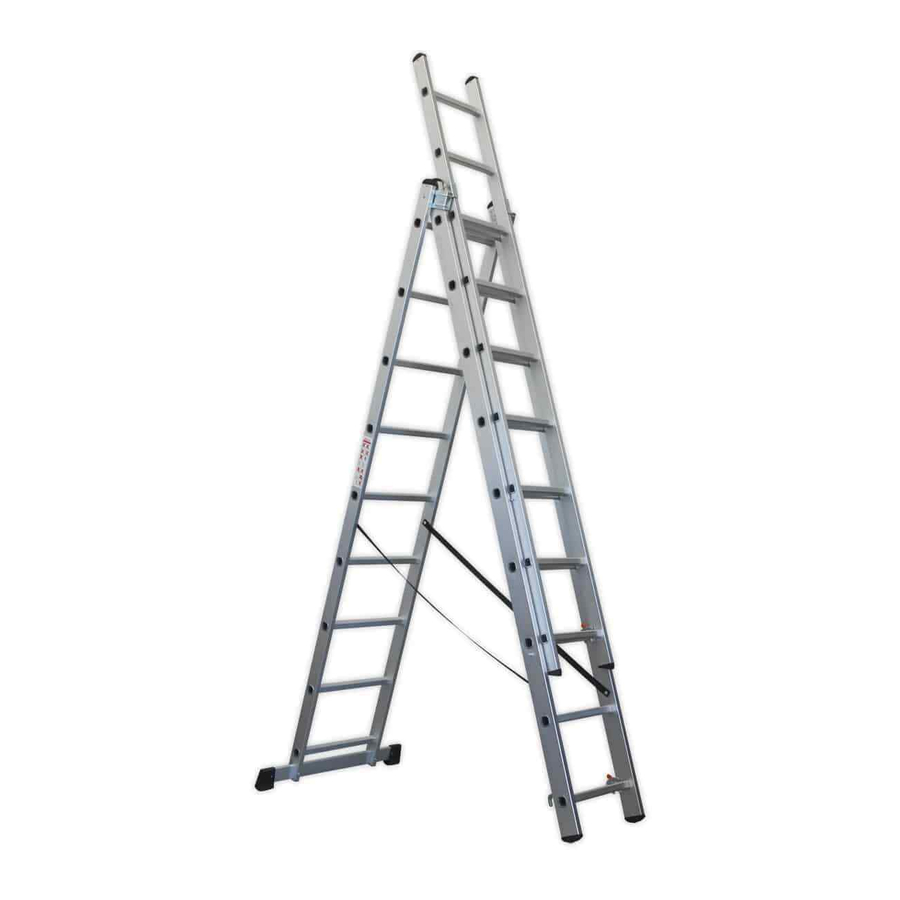
Advertisement
Quick Links
Thank you for purchasing a Sealey product. Manufactured to a high standard, this product will, if used according to these instructions,
and properly maintained, give you years of trouble free performance.
IMPORTANT: PLEASE READ THESE INSTRUCTIONS CAREFULLY. NOTE THE SAFE OPERATIONAL REQUIREMENTS, WARNINGS & CAUTIONS. USE
THE PRODUCT CORRECTLY AND WITH CARE FOR THE PURPOSE FOR WHICH IT IS INTENDED. FAILURE TO DO SO MAY CAUSE DAMAGE AND/OR
PERSONAL INJURY AND WILL INVALIDATE THE WARRANTY. KEEP THESE INSTRUCTIONS SAFE FOR FUTURE USE.
Refer to
instruction
manual
1. SAFETY
1.1.
GENERAL SAFETY REQUIREMENTS
WARNING! Risk of falling from the ladder.
‰
Refer to instructions.
9
Inspect the ladder after delivery.
9
Before every use visually check the ladder is not damaged and is safe to use.
9
DO NOT use a damaged ladder.
8
Observe maximum total load 150kg.
9
DO NOT use the ladder on a unlevel or unfirm base.
8
DO NOT over reach.
8
DO NOT erect ladder on contaminated ground.
8
Observe maximum number of users.
9
DO NOT ascend or descend unless you are facing the ladder.
8
Keep a secure grip on the ladder when ascending or descending. Maintain a handhold whilst
9
working from a ladder or take additional safety precautions if you cannot.
Avoid work that imposes a sideways load on ladders, such as side on drilling through solid materials.
9
DO NOT carry equipment which is heavy or difficult to handle whilst using a ladder.
8
DO NOT wear unsuitable footwear when climbing a ladder.
8
DO NOT use a ladder if you are not fit enough. Certain medical conditions or medication, alcohol
8
or drug abuse could make ladder use unsafe.
DO NOT spend long periods on a ladder without regular breaks (tiredness is a risk).
8
Prevent damage of the ladder when transporting e.g. by fastening and, ensure they suitably placed
9
to prevent damage.
Ensure the ladder is suitable for the task.
9
DO NOT use the ladder if contaminated, e.g. with wet paint, mud, oil or snow.
8
DO NOT use the ladder outside in adverse weather conditions, such as strong wind.
8
For professional use a risk assessment shall be carried out respecting the legislation in the country of use.
9
When positioning the ladder take into account risk of collision with the ladder e.g. from pedestrians, vehicles or doors. Secure doors
9
(not fire exits) and windows where possible in the work area.
WARNING! ELECTRICITY HAZARD
‰
Identify any electrical risks in the work area, such as overhead lines or other exposed electrical equipment and DO NOT use the ladder
9
where electrical risks occur.
Use non-conductive ladders for unavoidable live electrical work.
9
DO NOT use the ladder as a bridge.
8
DO NOT modify the ladder design.
8
DO NOT move a ladder while standing on it.
8
For outdoor use caution to the wind.
9
If a ladder is delivered with stabiliser bars these bars should be fixed by the user before the first use, see assembly section overleaf.
9
Check if ladder is suitable for domestic/professional use.
9
1.2.
SAFETY REQUIREMENTS FOR LEANING LADDERS
Leaning ladders with rungs shall be used at the correct angle.
9
Leaning ladders with steps shall be used so that the steps are in a horizontal position.
9
Ladders used for access to a higher level shall be extended at least 1 metre above the landing point and secured, if necessary.
9
DO NOT lean the ladder against unsuitable surfaces.
8
Ladder must never be moved from the top.
8
DO NOT stand on the top three steps/rungs of a leaning ladder.
8
1.3.
SAFETY REQUIREMENTS FOR STANDING LADDERS
DO NOT step off the side of a standing ladder onto another surface.
8
Open the ladder fully before use.
9
Use the ladder with restraint devices engaged only.
9
Standing ladders shall not be used as a leaning ladder unless it is designed to do so.
9
DO NOT stand on the top two steps/rungs of a standing ladder without a platform and a hand/knee rail.
8
© Jack Sealey Limited
COMBINATION LADDER 3-SECTION
ACL3.V4, ACL307.V2, ACL312.V3
MODEL NO'S:
Original Language Version
DO NOT step on any rungs
past this point
ACL3.V4, ACL307.V2, ACL312.V3, Issue:3 (1) 02/07/20
Advertisement

Summary of Contents for Sealey ACL3.V4
- Page 1 ACL3.V4, ACL307.V2, ACL312.V3 MODEL NO’S: Thank you for purchasing a Sealey product. Manufactured to a high standard, this product will, if used according to these instructions, and properly maintained, give you years of trouble free performance. IMPORTANT: PLEASE READ THESE INSTRUCTIONS CAREFULLY. NOTE THE SAFE OPERATIONAL REQUIREMENTS, WARNINGS & CAUTIONS. USE THE PRODUCT CORRECTLY AND WITH CARE FOR THE PURPOSE FOR WHICH IT IS INTENDED.
- Page 2 Important: No Liability is accepted for incorrect use of this product. Warranty: Guarantee is 12 months from purchase date, proof of which is required for any claim. Sealey Group, Kempson Way, Suffolk Business Park, Bury St Edmunds, Suffolk. IP32 7AR 01284 757500 01284 703534 sales@sealey.co.uk...





